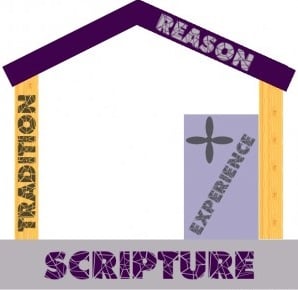“T,” one of our most faithful readers of this blog, has a set of questions about the value of “tradition” in the Christian church… and his appeal to the Wesleyan Quadrilateral is an excellent example of doing just what he is advocating.
I’m thinking of how we evaluate such things as the style of music we sing, the kinds of instruments that are used, the architecture of a church, the kind of lighting we use, the kind of Sunday school material we use — whether to have Sunday school — or VBS during the summer, the requirements for a pastor or a youth pastor … all of these have “Traditions”. Do we follow the Tradition or not? Some of the things that are so important to a local church are not even found in the Bible? (Like circumscribed Sunday morning services.)
Or what’s a church tradition your church struggled with?
T:
I can be a little rough on ‘tradition’ from time to time. “Because we’ve always done it that way” is one of my least favorite phrases. In my life to date, I have tended to favor the other members of Wesley’s Quadrilateral in my theology (Bible, Experience, Reason), but Tradition’s stock is steadily rising for me, or maybe I’m just becoming more conscious and welcoming of it’s inevitable role.
My basic posture now is that I strongly believe that it’s important and valuable to let voices from the past speak today, even have deference, particularly when Christians, individually or corporately, are dealing with central matters of faith, practice or experience. (I sure wish someone around me had known about or told me of “the dark night of the soul,” for instance, while I was in it rather than after!)
That said, I’m the first to say that it’s also obvious from Church history, long and short, that tradition can give momentum to good and bad ideas alike. And some tradition is like most other things in this world– it starts out useful, but wears out or decay over time. In the end, listening to tradition is like adding “multiple counselors”–listening to them will reduce, but not eliminate, bad thinking and decisions.
But how about you? How have you seen your Christian tradition encourage good or prevent it? How have you seen tradition’s influence push God’s mission forward? How have you seen it get in the way or develop blindspots? What are the best “gems” for God’s work today from your tradition, or which do admire from afar? What traditions seem more like stumbling blocks than gems? Which dead traditions need resurrection? Which living ones need reform? Which ones need burial or at least consideration of it?


